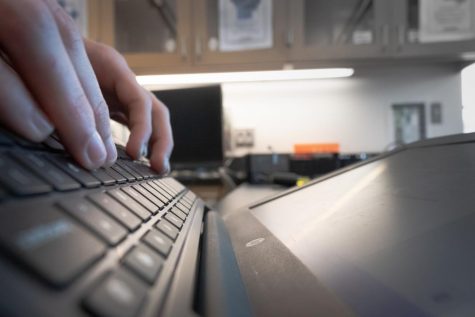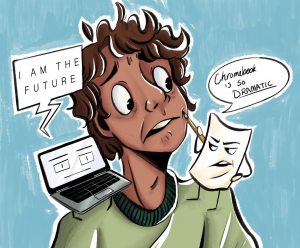Chromebooks: A Quick Solution With Far-Reaching Consequences.
Mar 4, 2020
Sage Creek prides itself on its innovative take on high school education. In addition to offering core classes like math, English, science, language and a variety of electives, SCHS offers two pathways: Engineering and Biomedical Science. Through these pathway classes, students gain skills that more tangibly apply to their future lives as professionals and citizens. Ultimately, Sage Creek has proven itself willing to buck trends in favor of new approaches that teach students more useful life skills. This can even be seen in Sage Creek’s list of “core values” listed on the front page of our school loop website. It seems that most everything at SCHS is built with this principle in mind, with only one notable exception: Chromebooks.
Google champions simplicity as one of Chromebooks’ core ideals, that much is apparent when you visit their ‘Meet ChromeOS’ web page. Although this ease of use may be beneficial when typing in Google Docs or when using Google Slides, it is highly detrimental to students’ ability to learn vital technical skills. As the world around us becomes increasingly dominated by circuitry and processors, a more detailed understanding of the machines that surround us becomes necessary. That understanding should be deeper than simple web browser use, in any case. Should students fail to understand technology when they are in high school, they will be unable to make beneficial choices later in life as consumers.

Sophomore Emmerson Montgommery uses a Chromebook during Computer Repair Club to quickly record meeting notes on Google Docs. In spite of their downsides, Chromebooks can still be useful to students as everyday tools.
Although it may seem like it at face value, Google’s efforts to introduce their products into a more educational setting are not quite altruistic. In exchange for providing chromebooks and other products, the corporation hopes to gain access to the next generation of computer users. According to a New York Times Article titled: ‘How Google Took Over The Classroom,’ some schools even encourage their students to graduate from Google learners to Google consumers.
“Every year, several million American students graduate from high school. And not only does Google make it easy for those who have school Google accounts to upload their trove of school Gmail, Docs and other files to regular Google consumer accounts — but schools encourage them to do so.”
Chromebooks are the foundation of a Google-branded ‘walled garden’ being built around students. In keeping its operating system simple and easy to use, Google aims to limit the choices that students can make as consumers once they graduate high school.
In the open market, there exist many consumer and privacy-friendly alternatives to Google’s line of products; however, many of these alternatives demand technical skill from the end user. Students who are taught exclusively using Chromebooks are simply denied the ability to choose those alternatives.
That very same lack of technical skill may even have larger implications for our planet’s future. One article from United Nations University demonstrates as much.
“Experts foresee a further 17% increase — to 52.2 million metric tonnes of e-waste by 2021 — the fastest growing part of the world’s domestic waste stream.”
Repairing technology requires a great deal of technical skill. For much of the population, computers resemble a black box; they can be used to accomplish tasks, but their inner workings remain arcane and mysterious. Therefore, it is far simpler to throw away old or malfunctioning electronics. By failing to teach students those technical skills, Chromebooks help perpetuate this attitude towards tech, and the ‘throw it away’ mentality that follows.
Although Chromebooks may be beneficial in some aspects, they ultimately fail to support SCHS’ “core value” aspirations as a school. Unlike many of the other innovations put in place at Sage Creek, they do not teach students vital skills that will help them make better choices. They may be convenient, but that convenience comes at a great cost to students and the planet.






